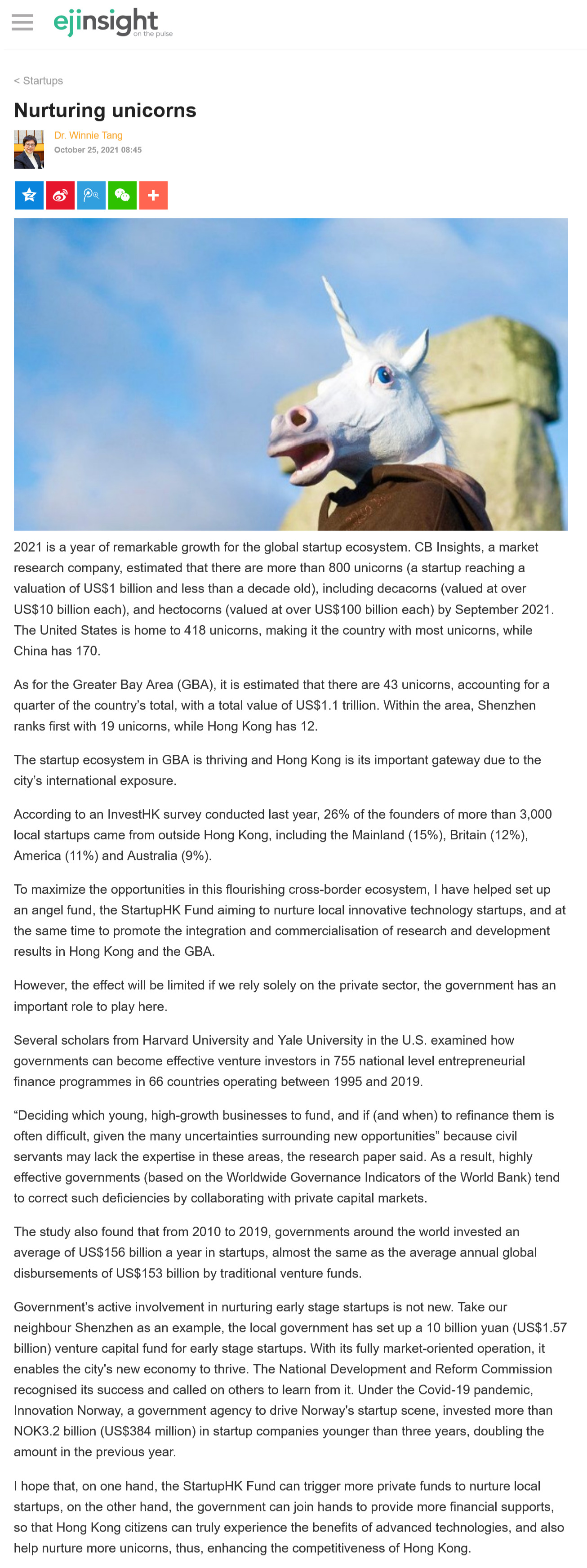網上版請按此

Nurturing unicorns
2021 is a year of remarkable growth for the global startup ecosystem. CB Insights, a market research company, estimated that there are more than 800 unicorns (a startup reaching a valuation of US$1 billion and less than a decade old), including decacorns (valued at over US$10 billion each), and hectocorns (valued at over US$100 billion each) by September 2021. The United States is home to 418 unicorns, making it the country with most unicorns, while China has 170.
As for the Greater Bay Area (GBA), it is estimated that there are 43 unicorns, accounting for a quarter of the country's total, with a total value of US$1.1 trillion. Within the area, Shenzhen ranks first with 19 unicorns, while Hong Kong has 12.
The startup ecosystem in GBA is thriving and Hong Kong is its important gateway due to the city's international exposure.
According to an InvestHK survey conducted last year, 26% of the founders of more than 3,000 local startups came from outside Hong Kong, including the Mainland (15%), Britain (12%), America (11%) and Australia (9%).
To maximize the opportunities in this flourishing cross-border ecosystem, I have helped set up an angel fund, the StartupHK Fund aiming to nurture local innovative technology startups, and at the same time to promote the integration and commercialisation of research and development results in Hong Kong and the GBA.
However, the effect will be limited if we rely solely on the private sector, the government has an important role to play here.
Several scholars from Harvard University and Yale University in the U.S. examined how governments can become effective venture investors in 755 national level entrepreneurial finance programmes in 66 countries operating between 1995 and 2019.
"Deciding which young, high-growth businesses to fund, and if (and when) to refinance them is often difficult, given the many uncertainties surrounding new opportunities" because civil servants may lack the expertise in these areas, the research paper said. As a result, highly effective governments (based on the Worldwide Governance Indicators of the World Bank) tend to correct such deficiencies by collaborating with private capital markets.
The study also found that from 2010 to 2019, governments around the world invested an average of US$156 billion a year in startups, almost the same as the average annual global disbursements of US$153 billion by traditional venture funds.
Government's active involvement in nurturing early stage startups is not new. Take our neighbour Shenzhen as an example, the local government has set up a 10 billion yuan (US$1.57 billion) venture capital fund for early stage startups. With its fully market-oriented operation, it enables the city's new economy to thrive. The National Development and Reform Commission recognised its success and called on others to learn from it. Under the Covid-19 pandemic, Innovation Norway, a government agency to drive Norway's startup scene, invested more than NOK3.2 billion (US$384 million) in startup companies younger than three years, doubling the amount in the previous year.
I hope that, on one hand, the StartupHK Fund can trigger more private funds to nurture local startups, on the other hand, the government can join hands to provide more financial supports, so that Hong Kong citizens can truly experience the benefits of advanced technologies, and also help nurture more unicorns, thus, enhancing the competitiveness of Hong Kong.
Dr. Winnie Tang
Adjunct Professor, Department of Computer Science, Faculty of Engineering; Department of Geography, Faculty of Social Sciences; and Faculty of Architecture, The University of Hong Kong